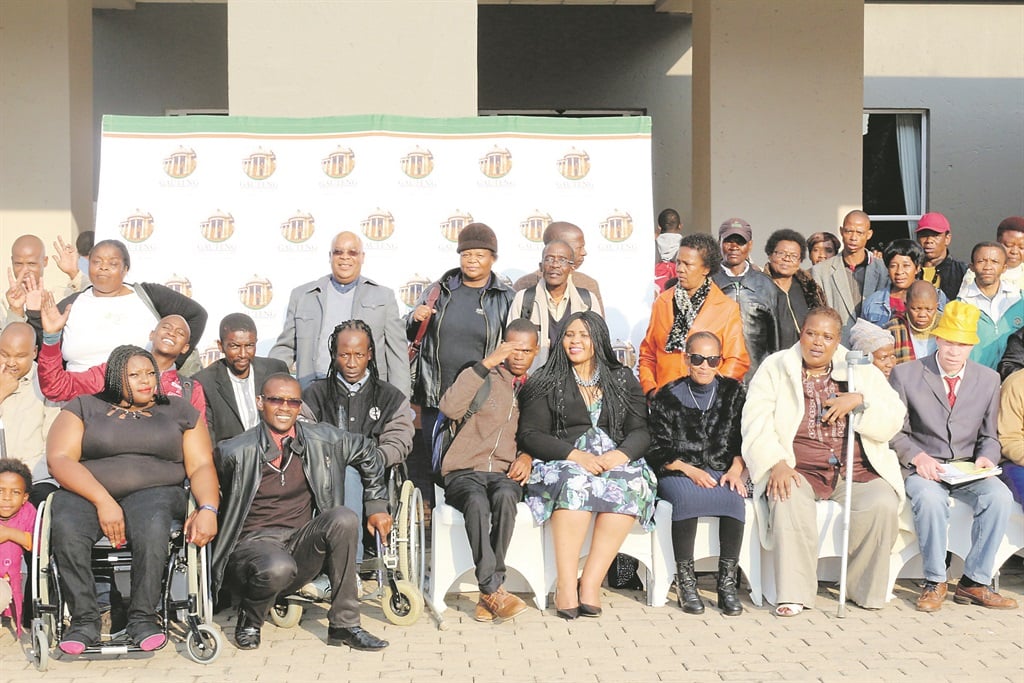
A bold, two-pronged approach to empowering impaired people through staking a claim for their space and doing away with self-pity emanated from a recent indaba for people with disabilities.
The seminar, hosted by the Gauteng provincial legislature at the Birchwood Hotel and Conference Centre on December 7, succeeded in consolidating interests around and adding fresh impetus to the quest for seeking quantitative and qualitative solutions for people living with disabilities (PwD).
This mission – to motivate and manoeuvre around the manifold challenges facing disabled people – was succinctly elucidated by Uhuru Moiloa, deputy speaker for the Gauteng provincial legislature.
Addressing a packed conference, he said: “Our responsibility as the Gauteng legislature is to ensure that persons with disabilities are not disadvantaged based on their position in the economy, social intervention or any activity that makes humanity thrive.”
This proactive sentiment was echoed in the seminar’s theme – Following up on Our Commitment for Persons with Disabilities in the Gauteng Province.
In addition to its clear intent to bolster the cause of functionally impeded people, the seminar also managed to highlight the challenges that people with disabilities face every day.
BY EXTENSION, THE SEMINAR SOUGHT TO:
. Establish platforms for empowerment;
. Promote and maintain the status of people with disabilities; and
. Create awareness around their rights, wellbeing, safety and security.
It was also decided that it was imperative to provide channels for continued, constructive discussion and to duly implement resolutions agreed upon during the seminar.
One of the delegates who attended the seminar was Rhulani Baloyi, a prominent activist who had some strong sentiments to share with the audience.
Speaking about the stigma attached to disabled people – that they are demanding and difficult to deal with in the workplace – Baloyi encouraged attendees to throw off the yoke of self-pity.
She said: “It is up to us to change how people perceive us. The aim is to be respected and not to have people feel pity for us.”
As a person who had to overcome the challenge of being blind, Baloyi followed her dream of becoming a journalist and, in spite of the hardship she faced, became a renowned radio and TV presenter at the SABC.
As a former co-presenter of the SABC1 talk show Shift, she excelled in reconfiguring mind-sets and changing attitudes, thereby opening the eyes of people to what being disabled is all about.
True to its constitutional decree, namely being convened as a public participation tool in response to section 118 of the Constitution, the seminar endeavoured to establish itself as a forum of primacy on the topic of disability discourse.
In this sense, empowering the seminar from within so it could help to empower people outside, the Gauteng legislature played an incisive role.
In a statement released to the press, it said that the seminar was convened “to ensure that people with disabilities play an active role in the decision-making processes of the legislature”.
It added that this had particular bearing on drafting “laws and discussions that directly affect people with disabilities”.
In a more instructive sense, the seminar served to red-flag instances of severe unfairness and compromising positions pertaining to the daily situations that disabled people may find themselves in.
Attitudes among members of the SA Police Service, for example, were some of the problem areas brought to light during the seminar.
Although special provision is made by the police to accommodate disabled people, it was stated that: “There are no assistants [at the police service] to understand the needs of people living with disabilities.”
In a country rife with crime, where people with disabilities are often preyed upon by perpetrators because of their impairments, “reporting a case to the police can be challenging and demeaning”.
Not helping blind people to identify suspects in pursuance of a criminal investigation and subsequent prosecution is just one of the instances in which a disabled person’s democratic rights are violated.
The seminar therefore unanimously endorsed the notion that “SA Police Service members and police stations need to be trained and equipped with alternative measures to accommodate different circumstances for cases to be further investigated outside conventionally prescribed procedures”.
Basically, it boils down to not taking for granted the idea that society’s systems necessarily suit everyone. Clearly, all-encompassing provision must be made to assist all the country’s citizens, no matter who they are.
Another area of concern identified at the seminar was higher education and learning.
Among other things, it was stated at the seminar that “the language used in textbooks is not disability sensitive” and that there is a palpable “lack of information on and about people with disabilities”.
Furthermore, “there is also a lack of learning material, learning tools and assistive devices for different kinds of disabilities”, which is why disabled pupils and students sometimes have to rely on their classmates for notes.
The seminar subsequently endorsed the decision that “the department of higher education should have a representative from the people with disabilities sector at a high level”, and that “government should ensure that access to colleges is increased for people with disabilities”.
There can be no doubt that the discussions at the seminar “strongly emphasised how essential official intervention is to ensure that even schools have a curriculum of different disabilities”.
In summary, a post-seminar statement stressed that “education and awareness of the different disabilities is crucial in our communities”. Ultimately, it is only through awareness and understanding that we can see the link between claiming space for disabled people and eliminating the crippling psychological effect of self-pity.
After all, it is this two-pronged approach that many believe paves the way to total empowerment.
It is safe to say that it is only through uplifting people with disabilities that they can be successfully integrated into society – free from stigma and fully empowered within the space they share with their able-bodied counterparts.
Equality, in ways that we often don’t see, is after all what each and every one of us deserves to experience on the daily trajectory of our lives.
You can also visit our website; follow the Gauteng Legislature on Twitter ; or like our FB page.




 Publications
Publications
 Partners
Partners









